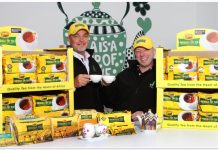In support of World Food Day and in line with growing food security concerns, Roxanne McLean, Owner of Founder Foods and CEO of FreshBox, encourages us to rethink what we eat, how we get our food and how we share our food.
“As we progress deeper into the 21st century and the global population continues to grow, the question of food security comes up more frequently. Agriculture is by far the biggest consumer of habitable land on earth and our capacity to keep converting land to agriculture has a fast approaching limit. But with over 800 million people estimated to suffer from starvation or malnutrition globally already, according to the world health organisation, how will the world produce enough food to sustain a growing population into the future?” says Roxanne.
When it comes to the problem of food security, increases in technology are often proposed as the solution: technology to increase yields on farms, processing foods to last longer, stretch further and sustain more. While technology is useful, the proposed solutions often mean an increase in the complexities in our food and food supply chains. “When it comes to our food, we need to look at the solutions hidden in simplicity: simplifying what we eat, how we get it and ultimately how we share it. We need to rethink our food,” adds Roxanne.

Rethinking what we eat
Globally, out of all the land used for agriculture, it is estimated less than 30% is dedicated to the production of crops for human consumption. The rest is largely consumed by livestock and crops produced to feed livestock: our meat. South African agriculture largely mirrors these global statistics. With the land use that meat production requires, science is suggesting more and more that we cannot sustainably produce the amount of meat we eat – we simply will not have the space. In addition, when it comes to our health, the biggest study on nutrition ever done, published in 2019, concludes the largest indicator of our diet-related health is the level of simple, plant-based, wholefoods within our diet. While the debate on the benefits of 100% plant-based diets continues, there is certainly agreement that we can all benefit by reducing the amount of meat we consume and introduce more simple, plant-based wholefoods. We need to rethink what we eat.
Rethinking how we get our food
With the way we currently produce and consume food it’s estimated that more than a third of all food produced is wasted. With fresh produce bearing the biggest waste burden. Much of this waste is happening before our food reaches household level. The more steps our food goes through from farm to shelf, the more waste along the way. We need to simplify our food systems and choose food that is sourced as direct from producers as possible with less transport, less processing, less packaging and less waste. We need to rethink how we get our food.
Rethinking how we share our food.
It’s estimated more than 50% of children in South Africa live close to or below the poverty line, without consistent access to healthy food. Combine this with our food waste statistics and it’s obvious we do not have a food security issue, we have a food distribution issue.
Children who grow up without consistent access to healthy food are at risk of malnutrition. A malnourished child is at risk of neurological and physiological stunting. Research has shown children who experience sever stunting go on to complete up to 5 less grades in school and earn significantly less wages. “If this pandemic has taught us anything, it’s that in a society with large inequalities, everyone eventually loses. We cannot bridge an education gap before bridging the nutrition gap,” says Roxanne.
Organisations such as FreshBox are no longer a purely charitable initiative, they are a necessity. FreshBox aims to sustainably reduce malnutrition in South Africa by donating fresh fruit to children most at risk of malnutrition for each FreshBox sold.
“At FreshBox we believe making a difference starts with doing business differently. By building in food donation as part of our model we plan to reduce malnutrition in South Africa by donating locally grown, beautiful fresh fruit to a child in need while supplying you with your fresh produce needs. Thanks to our partnership with iThemba Lethu, who place youth workers in at-risk schools, we are able to feed the most at-risk children at key locations. Our long-term goal is to bring healthy, nutritious local food to thousands of children where research has shown nutrition is most crucial,” explains Roxanne.
By rethinking the way we share our food, and incorporating distribution of food to those at risk of malnutrition within the distribution of those who are not, we can work to address both the food waste and malnutrition issues.
“Founder Foods and FreshBox are built on the principles of simplifying our food system – rethinking what we eat, how we get it and how we share it. It is important we encourage and support innovation like this within the food industry. With the average age of a farmer now above 60 and our available land decreasing, food security is a concern that affects us all. No matter what your view on diet, we need to rethink food,” concludes Roxanne.
For more information please contact Roxanne McLean [email protected] or [email protected] or visit www.founderfoods.co.za / www.facebook.com/founderfoods / www.instagram.com/founderfoods / https://www.facebook.com/FreshBoxSA / www.freshbox.co.za






